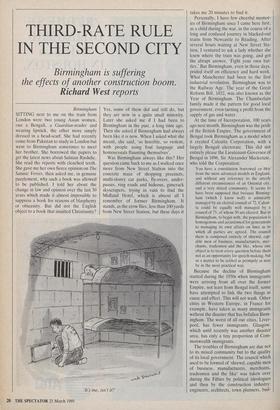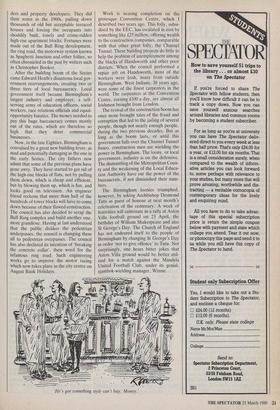THIRD-RATE RULE IN THE SECOND CITY
Birmingham is suffering the effects of another construction boom.
Richard West reports
Birmingham SITTING next to me on the train from London were two young Asian women, one a Bengali, a Guardian-reader and wearing lipstick, the other more simply dressed in a head-scarf. She had recently come from Pakistan to study in London but went to Birmingham sometimes to meet her brother. She borrowed the papers to get the latest news about Salman Rushdie. She read the reports with clenched teeth. She gave me her own fierce opinion on The Satanic Verses, then asked me, in genuine puzzlement, why such a book was allowed to be published. I told her about the change in law and opinion over the last 30 years which made it almost impossible to suppress a book for reasons of blasphemy or obscenity. But did not the English object to a book that insulted Christianity? Yes, some of them did and still do, but they are now in a quite small minority. Later she asked me if I had been to Birmingham in the past, a long time ago. Then she asked if Birmingham had always been like it is now. When I asked what she meant, she said, 'so horrible, so violent, with people using foul language and homosexuals flaunting themselves'.
Was Birmingham always like this? Her question came back to me as I walked once more from New Street Station into the concrete maze of shopping precincts, multi-storey car parks, fly-overs, under- passes, ring roads and hideous, gimcrack skyscrapers, trying in vain to find the Midland Hotel, which is almost all I remember of former Birmingham. It stands, as the crow flies, less than 100 yards from New Street Station, but these days it
'It's me, isn't it?'
takes me 20 minutes to find it.
Personally, I have few cheerful memor- ies of Birmingham since I came here first, as a child during the war, in the course of a long and confused journey in blacked-out trains from Newcastle to Reading. After several hours waiting at New Street Sta- tion, I ventured to ask a lady whether she knew where the train was going, and got the abrupt answer, 'Fight your own bat- tles.' But Birmingham, even in those days, prided itself on efficiency and hard work. What Manchester had been to the first industrial revolution, Birmingham was to the Railway Age. The year of the Great Reform Bill, 1832, was also known as the Year of Birmingham. The Chamberlain family made it the pattern for good local government, even turning a profit from the supply of gas and water.
At the time of Incorporation, 100 years ago next month, Birmingham was the pride of the British Empire. The government of Bengal took Birmingham as a model when it created Calcutta Corporation, with a largely Bengali electorate. This did not entirely please the Lieutenant-Governor of Bengal in 1896, Sir Alexander Mackenzie, who told the Corporation:
You have a constitution borrowed en bloc from the most advanced models in England. and without any reference to the utterly different circumstances of an Oriental city, and a very mixed community. It seems to have been supposed that because Birming- ham (which I know well) is admirably managed by an elected council of 72, Calcut- ta could be equally well managed by a council of 75, of whom 50 are elected. But in Birmingham, to begin with, the population is homogenous and accustomed for generations to managing its own affairs on lines as to which all parties are agreed. The council there is composed entirely of shrewd, cap- able men of business, manufacturers, mer- chants, tradesmen and the like, whose one object is to treat every question before them not as an opportunity for speech-making, but as a matter to be settled as promptly as may he in the most practical way.
Because the decline of Birmingham started during the 1950s when immigrants were arriving from all over the former Empire, not least from Bengal itself, some have attempted to link the two things as cause and effect. This will not wash. Other cities in Western Europe, in France for example, have taken as many immigrants without the disaster that has befallen Birm- ingham. The worst of all our cities, Liver- pool, has fewer immigrants. Glasgow, which until recently was another disaster area, has only a tiny proportion of Com- monwealth immigrants.
The troubles of Birmingham are due not to its mixed community but to the quality of its local government. The council which used to be formed of 'shrewd, capable men of business, manufacturers, merchants, tradesmen and the like' was taken over during the Fifties by political ideologues and then by the construction industry: engineers, architects, town planners, bull- ders and property developers. They did their worst in the 1960s, pulling down thousands of old but acceptable terraced houses and forcing the occupants into shoddily built, lonely and crime-ridden high-rise apartment blocks. Fortunes were made out of the Bull Ring development, the ring road, the motorway system known as Spaghetti Junction and other follies, so often chronicled in the past by writers such as Christopher Booker.
After the building boom of the Sixties came Edward Heath's disastrous local gov- ernment rearrangements, creating two or three tiers of local bureaucracy. Local government itself became Birmingham's largest industry and employer, a self- serving army of education officers, social workers, race relations officials and equal- opportunity fanatics. The money needed to pay this huge bureaucracy comes mostly out of the rates, which are therefore so high that they deter commercial businesses.
Now, in the late Eighties, Birmingham is convulsed by a great new building fever, as mad and potentially damaging as the one in the early Sixties. The city fathers now admit that some of the previous plans have gone awry. They have started to get rid of the high-rise blocks of flats, not by pulling them down, which is cheap and efficient, but by blowing them up, which is fun, and looks good on television. An engineer friend reckons that more than half of the hundreds of tower blocks will have to come down because of their flawed construction. The council has also decided to scrap the Bull Ring complex and build another one, more grandiose. Having at last understood that the public dislikes the pedestrian underpasses, the council is changing them all to pedestrian overpasses. The council has also declared its intention of 'breaking the concrete collar', their word for the infamous ring road. Such engineering works go to improve the motor racing which now takes place in the city centre on August Bank Holidays. Work is nearing completion on the grotesque Convention Centre, which I described two years ago. This folly, subsi- dised by the EEC, has escalated in cost by something like £25 million, offering wealth to the construction companies, comparable with that other great folly, the Channel Tunnel. These building projects do little to help the problem of unemployment among the blacks of Handsworth and other poor districts. When the council performed a repair job on Handsworth, most of the workers were Irish, many from outside Birmingham. West Indians, 30 years ago, were some of the finest carpenters in the world. The carpenters at the Convention Centre, earning £100 a day, are almost all Irishmen brought from London.
The revival of the construction boom has once more brought tales of the fraud and corruption that led to the jailing of several people, though not nearly enough people, during the two previous decades. But as long as the boom lasts, or until this government falls over the Channel Tunnel fiasco, construction men are wielding the power in Birmingham. The loony, or local government, industry is on the defensive. The dismantling of the Metropolitan Coun- ty and the weakening of the Local Educa- tion Authority have cut the power of the bureaucrats, if not diminished their num- bers.
The Birmingham loonies triumphed, however, by asking Archbishop Desmond Tutu as guest of honour at next month's celebration of the centenary. A week of festivities will culminate in a rally at Aston Villa football ground on 23 April, the birthday of William Shakespeare and also St George's Day. The Church of England has not endeared itself to the people of Birmingham by changing St George's Day in order 'not to give offence' to Tutu. Not surprisingly, one hears bitter jokes that Aston Villa ground would be better util- ised for a match against the Mandela United Football Club, under its genial, sjambok-wielding manager, Winnie.
'He's got something style can't buy. Money.'



















































 Previous page
Previous page